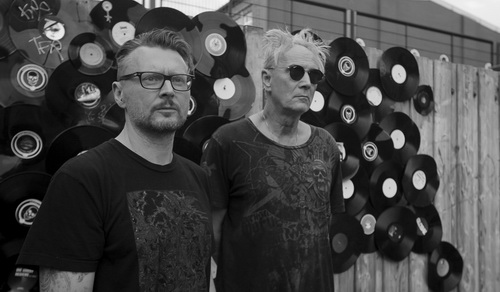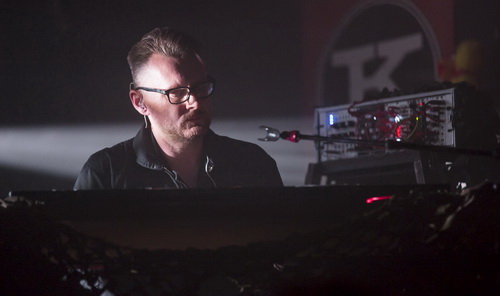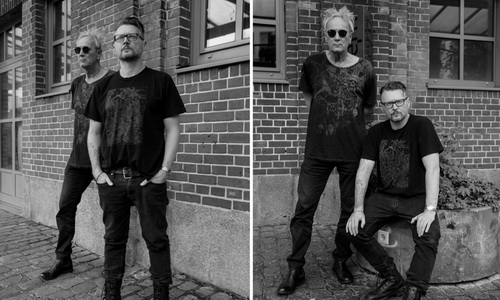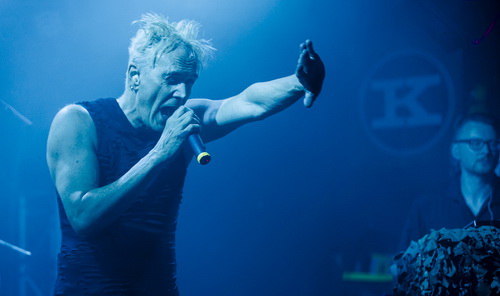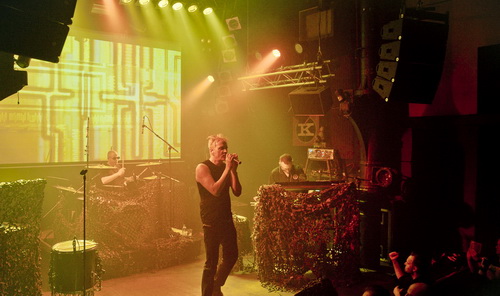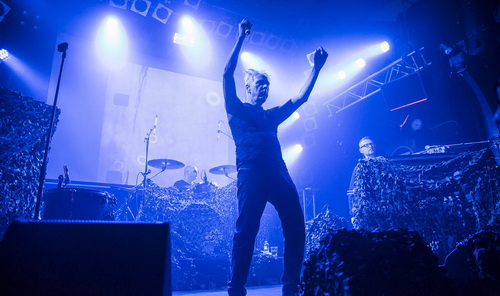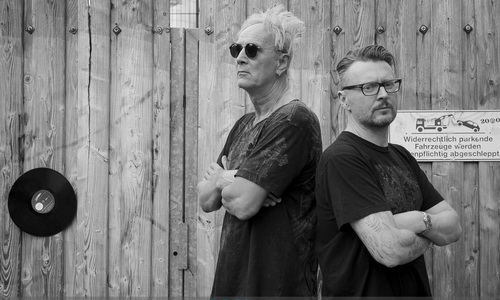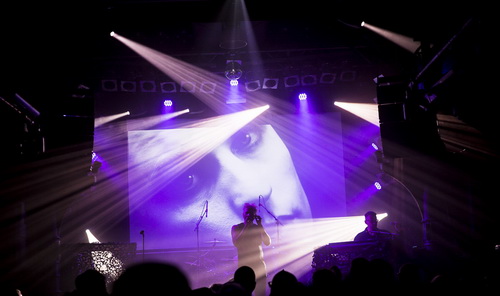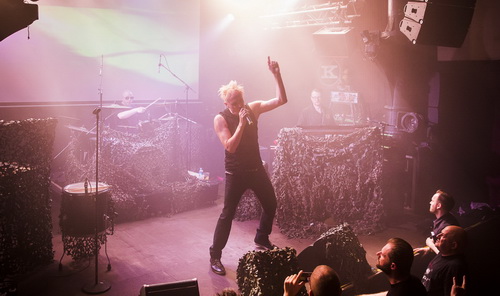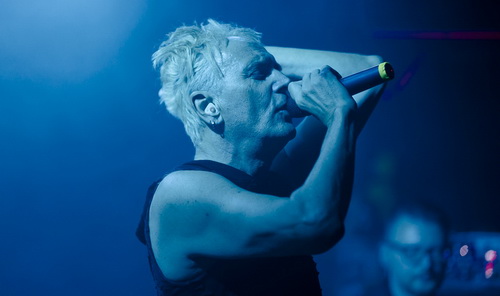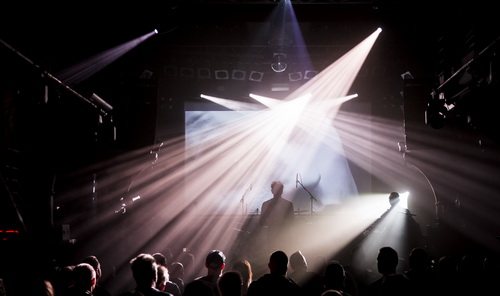
Welcome to the future – Front Line Assembly interviewed in Hamburg
Posted In Interviews,Slider by Jimi Nilsson
We have interviewed Front Line Assembly numerous times but Bill Leeb and Rhys Fulber are as busy as always. There’s lots of new stuff to talk about like two FLA albums, a single with Robert Görl, a massive tour, Rhys’ solo album and new Delerium. We sat down with Bill Leeb in Hamburg for a long chat about creating gaming soundtracks, the upcoming album, collaborations and side projects. 34 years into his career – older and wiser – he also reflects on the past, and looks into the future. We also had a photo session with Bill and Rhys, and shot them live as well.
A slightly younger version of me got a copy of FLA’s mini-album “Disorder” in 1988 and I was immediately captured by the aggressive rhythms in “Body Count”, and within two weeks I had bought their three previous albums as well. I have followed their interesting journey ever since.
Now it’s 2018, a year that started out with a huge loss for the band. Band member Jeremy Inkel, the architect behind the modern Front Line sound, passed away at the young age of 34 due to complications from asthma. Six months after his death, Front Line Assembly released their sophomore “AirMech” soundtrack “WarMech”, dedicated to the memory of Inkel.
There’s a mind-boggling band history to talk about. However Bill Leeb starts off in coffeehouse novelties he has yet to discover. So we use the first five minutes, with a little help by the waitress, to discuss what a Flat White is and why there’s too many coffee choices on the menu at the tiny café we’re at. The interview then starts with their latest soundtrack “WarMech”.
Back in the wargames
You recently released your second game soundtrack “WarMech” to AirMech Wastelands. Was it supposed to be a sequel soundtrack from the beginning or just something that happened?
- We went with one record, they just approached us and wanted us to do one album. They were really happy with it and came back to us and said “Would you guys like to do a sequel?”. I guess it did really well for them and it was good for us as well, and then they had this new part of the game and we just thought “Sure, let’s do it”. We thought we could even do a better job with the second one, and I think the second one is even a better record.
The two “AirMech” games are quite different in how you approach them as a player. The first game is a person-to-person (PvP) game while the second is a role-playing game (RPG). How is the “WarMech” game score different from “AirMech”?
- The first one was kind of a learning experience for me and Jeremy and on the second one we brought in much more dubstep programming – it’s more intense in that way. I think that gives you a completely different feeling altogether, it’s just much more advanced in the programming.
Just like on “Echogenetic” we also experienced a lot with different types of dubstepping, so by the time we got to “WarMech” we had a lot of experience of it and in some of the songs there are the real key elements, we just pushed it to another level.
Have you played the games yourself?
- No haha, but I know the difference between them and I have seen the games being created. But haven’t played them, I’m not a gamer, haha.
But how are fan reactions considering that it is a soundtrack, not a new FLA album?
- We’re getting a lot of love on this one and it’s doing really well for a soundtrack, nobody expected it. Even college radio in America is playing it and I think it was number two on the iTunes electronic download list in North America. I keep thinking “Maybe we should do a third one”, hehe.
Making game soundtracks must be quite a different work process compared to creating something on your own?
- Ironically enough, once we got to look at the overall picture of it, the landscape, the feel of it, we just used our own intuition. We did a soundtrack to a game called “Quake” and there we actually focused more on parts, but in this one we just picked the themes and they just let us go with how we wanted it. What they did was that they took all the stems [a multi-track audio file] and if they needed anything they took the certain stems and incorporated it into the game.
It was really easy-going but it took over a year and three months to make it, on and off, because we put some time in it, but I think it’s really strong from track one to track twelve.
But was it much different working with this soundtrack compared to the “Quake” soundtrack?
- Oh yeah, different era, different equipment, different people plus I think we’re so much better now, it’s such a learning curve. As simple as it might seem, just like in painting it’s a huge learning curve to get to all these different levels and use all these techniques – and we have evolved a lot.
I can’t even listen to our early records, they sound so amateur and yet I understand that you have to start somewhere; I don’t think that anybody, or just a very few people, will start painting like Rembrandt did.
The technology at the time must have been a factor? The sampler technology in the nineties may not have allowed for better quality?
- Well, like the first two Skinny Puppy records we did, we didn’t have a computer, just a [Sequential] Pro-One synthesizer where you can sort of program arpeggios in it but it will never play the same way twice. For instance, when we went into the studio to record “Remission” it took a while trying to get the notes back (laugh).
It was kind of archaic where you needed to tune the analogue synthesizers every time you turned them on – it was a real piece of work! Not anything fancy, you really had to know how to play it whereas now it’s really more important to be a techno nerd than it is to be an actual musician.
Everything you hear now is really program-heavy, even mellow records now use this technology. The drums they want to play live, they put into Pro Tools so all the beats on every gig are computer perfect. Not everybody likes that sound but a lot of people also do.
But it must be much better at the production side of your work now if you compare to the technology back then? The first really popular samplers at the end of eighties, like the Akai S1000 that every industrial band with a budget probably bought, but those productions are much worse than many of the early analogue productions.
- Haha, there were those floppy disks which just had three seconds of memory. We had the Akai S900 and the Akai S950 but the big step up was the S1000 which had a lot of memory at the time and then we added an Emulator. We used to have all of them stacked together just to get a few samples like kicks and snares, and now with Pro Tools – the memory is unlimited.
I have kept a couple of the samplers and a few DAT:s, I still have those. We don’t use them but they had a sound of the time. Everything we do now is on Pro Tools, it’s just easier.
You have released three game soundtracks now, would the next natural step be to do film scores? Some of your music is for sure cinematic when you consider all the projects you’ve been involved in, especially Delerium.
- The whole thing with film scores is that it’s so competitive and it’s so hard to get into that world. When people are trying to get pitched for movies a whole room of composers show up, and it’s not really realistic to get any. If somebody approached us I know we can do it but it’s not my focus at all.
But who knows, the “WarMech” thing has just been out a couple of months and it’s doing really well and maybe something will develop from it. A lot of Delerium music has been used in films, I have a list of scores where it has been used and we get paid for, in “Tomb Raider” for instance, and it’s OK to do it that way instead.
Speaking of projects: How far have you come in the process of completing the next Front Line Assembly album? And Rhys just released a solo album too.
- Crazy enough, the new Front Line album is totally done for a February release; we’re just finishing the album credits and that stuff. We just don’t want to release it now because “WarMech” just came out, Rhys solo thing just came out, we got the Delerium single [“Stay”] and then we’re doing those Coldwave festivals, and Ohgr’s album is out. It’s just better to wait a little while.
And we have done an official cover song for the first time ever on a Front Line album with a guest singer, an American singer, and the song is in German since it’s a famous Austrian song. We never done it before and it’s kind of commercial but I think it’s supercool. Whether people love it or hate it I’m not too worried about, but I think it’s interesting to see how that one does.
And we also collaborate with Robert Görl on the new single “Eye on You”. He did some of the sequences on that, and Ian Pickering from Sneaker Pimps also did something, but I do the vocals.
And what theme will you have on the new Front Line album then?
- This song “Eye on You” is definitely about the paranoia of our governments watching us, that’s in the lyric, but there’s a couple of songs that are about the complexities in relationships between people today as well.
All these reality shows like “The Bachelor”, dating shows and stuff like that – it’s kind of a weird world. People staring on their phones and nobody really talk to each other anymore. Isn’t that weird or am I just old? You tell me!
“I never even considered it a career”
The last two days I have tried to figure out how many productions you’ve been involved in since you started but it’s a difficult task. How do you manage to still stay creative? What motivate you to continue?
- I always try to do something new and something different, a new singer, a new idea, and that kind of keeps it interesting to continue.
I don’t really think I work that hard though. Rhys works harder because he has his own studio and produced the first Kanga album, and that had a buzz, and he did the Youth Code album, so he’s more closer to get burned out than me because he is always in the studio whereas I have kind of a leisure life and float around more but I’m also older than Rhys, hehe; I don’t ever feel like I’m working too hard.
The most fun I have right now is to collaborate with people. We have a whole bunch of people on the new record, on four or five tracks, and different singers. It’s more fun like that you know, and I don’t think we need to prove anymore that we can make an album, haha.
Front Line Assembly is considered a pioneering band on the industrial/electronic scene and you have released albums since 1986. That’s impressive, especially if you also consider how productive you have been in all your other projects. Have you ever seen yourself as a pioneering band on the scene?
- A national music magazine said that Skinny Puppy was the most influential alternative electronic pioneers in Canada and I really believe that. If you go to M’era Luna or any similar places all bands sound like that, in one form or another, whether it’s Project Pitchfork or Suicide Commando, or any of those guys with distorted vocals and heavy synths.
But Front Line Assembly and Skinny Puppy sound quite different although you have a strong connection.
- We have different elements, obviously the vocalist is the big difference but I think the ideas in the heart is always the same. All our side projects are different as well; Ogre’s side project and Cevin’s Download are completely different from our Delerium.
Financially Delerium were the thing for us and we have a new single out called “Stay” and the remix just made its debut with the band Above & Beyond the other night in front of 35 000 people in the trance world; we’re lucky to be part of that. Rhys is even signed to Armada Records [EDM label founded by Armin van Buuren]. That way we’re pretty successful, and Delerium probably have a way bigger fanbase than Front Line.
When you consider all these different projects you have been involved in, and all the electronic genres you have covered with your different productions, would you say that Front Line Assembly is the main project or do you see them all as equally important?
- It goes back and forth between that and Delerium. Sometimes it’s nice to do something else, not only the same old thing, and Delerium have always been the opposite – quiet and calm with beautiful voices and has that sort of spirituality to it.
In the beginning it was different though; when I listen to those records I hear this kind of dark and heavy stuff in songs like “Drama” and “Bleeding”. It’s just so disconnected from working with top female singers now (laugh), and it’s kind of hard to believe how we got from there to here, but I never planned it.
But how do contemporary Delerium fans resonate with those first albums?
- I don’t think they connect, I’ve never seen any comments about it online or anything. I know that old fans go “We only like the old stuff, why did you guys change like that”, but for fans from “Karma” and on there’s no issue.
When you start releasing your first records you probably don’t think “I will do this for the next thirty-five years”. Could you ever have imagined that Front Line Assembly, and yourself, would cross the thirty-year border?
- I never even considered it a career, haha. The only thing I have ever really truly thought of is if I’m going to last in this business. You have to find more than one way to express yourself and that’s what me and Rhys thought in “Let’s do Intermix, let’s do Noise Unit” and he did Will while I started with Delerium, and after that we were back to Front Line.
To me it was like planting little seeds in the ground and see if any of them would grow, and they all sort of grew a little bit, and one grew more, and twenty years later we realized “Hey, we never had to get a real job and we’re getting better on what we’re doing”. It seems to work and I think that’s the big secret. If you’re in one big band and the bands splits up it’s hard to reconnect to the world, that’s why I think you need diversification.
When Rhys left Front Line and went to become a metal producer with Fear Factory and had a big career with those bands, it was good that I had other things to do and also kept Front Line going with new people
What is your experience of the major changes for Front Line over 35 years?
- With Front Line in the old days, when we did “Hard Wired”, metal guys would come to our shows, electronic guys would come and industrial fans turned up; instead of having five hundred people, a thousand people came to our shows. But now metal guys only go to metal shows, electronic guys only go to Deadmau5 – it’s very segregated. You just got to hope that whatever scene you’re into there’s enough people to support what you do.
The money thing, that’s another problem. The only way to really exist now is to play as much as possible; every man that can make a dollar is touring. And then you can go to Midge Ure and all these old eighties bands; there’s people who like to see them and they have the craft to be able to play live so they can still make a living out of it, because nobody is buying anything.
I’m glad I was part of the eighties when people were buying music and I got to see both sides of it. A lot of younger artists now they go to Bandcamp and YouTube, and they never really experienced selling 300 000 albums; if the sell 10 000 they do really well. At least me and Rhys have seen the juxtapose, we’ve experienced both, and I think it’s a better place for us to be. I have hard time to see that anything will change from how it is now.
Since you’ve done this for such a long time I need to ask the question: Do you think Front Line Assembly will exist in about 15 years from now?
- Hehe, I will keep on doing this as long as it’s enjoyable and I’m mentally and physically able to continue. I love art and literature, and collect art and stuff, and I’m very passionate about it; all of that inspires me. But life is also quite unpredictable, it could be over tomorrow, hehe.
It would be hard to imagine doing anything else and that’s the nice thing about Delerium you know; I can be old and grey and shaking, and still – if I can hear and see – I could be creative. It works out. But with Front Line it’s different but I think I can be involved in some way in the future as well.
Music is going to change as well. Pop music the last few years got stale and everything needs to fit a format either if it’s hip hop or a pop song and all that Beyoncé kind of vocal crap. It would be nice if someone came along to do something more simple and fresh again.
Music now is so diversified, that’s the big thing, even electronic music. With it all being so diversified it’s difficult and harder for any new big movement to come along because of this segregation. When I listen to The XX or The National I don’t think it’s anything special but I guess it is for young people, maybe I just don’t understand it, haha.
Bill the visionary
Over the years Front Line Assembly have built their timeless music legacy with powerful, challenging sounds on themes such as futurism, transhumanism and robotics, as well as cyber crime warfare and sci-fi, very often coated in a dystopian imagery of what the future holds for mankind. And many of the themes on early albums have started to come true.
Did Bill see the rapidly accelerating pace of technology as overwhelming already in the making of the video to “Mindphaser” in 1992? Or was his world uncomfortably close to Dystopia already in the eighties when he wrote the “Gashed Senses & Crossfire” album in 1989 and its theme built on oppression, violence and the fall of society as we know it?
What I find interesting is that you had premonitions that have started to come true. Mass surveillance, oppression, digital warfare and many other topics you brought into your song titles, lyrics, on artworks and record sleeves or have as overall themes on your records. Are you misanthropes or just have very perceptive imaginations of the world in general and people in particular?
- I’m a visionary, that’s why, haha!
Underneath I have a lot of paranoia and I don’t trust a lot of things no matter what anybody says or does. I think everything is grey, nothing is black and white. I have this vision that the way people are going on today; I wouldn’t want to be here in a hundred years because we’re going to have to evolve in a way that there is enough room for everybody to exist, and that means that everybody have to live with less, and that will create new problems.
We have the migration in the world, this guy running America pushing people against other people. And everything feels crowded; if you go to an airport, the surveillance, the questions – it’s too much and intimidating.
You know that movie “THX-1138”? To me that could be part of the future where everybody have to conform or be the same, you won’t be able to be an individual anymore because you will be conceived a threat. To keep everybody under control you have to find new systems and new ways – it’s going to be an odd world.
I would love to take a few years of my life now just to see what it’s like, and be able to come back, but I bet you it will look much different in a hundred years. All those thoughts will often end up on the records.
But isn’t it a pessimistic analysis of the future, that we can’t change such a scenario?
- No, is there a difference of being a pessimist or being a realist? Mankind has a strong sensibility for survival but I still think that one day in the future the one question that nobody ever wants to talk about, that we are too many people, that’s going to happen. Maybe “for ten years nobody is allowed to have children because we’re too many people in the world”. But how will people react? And will they have them in secrecy? Will they hide them?
Since you’re a visionary, what is the next weird thing we can expect in the world?
- I’m not the first to say it but it would be really interesting to see if the climate change scientists have predicted their future right, if the water levels will rise and if storms will be more violent. It seems like we will encounter more extremes in 20 years from now. Storms will become so extreme that people will have trouble to find shelter and we‘re going to have to find new ways to build buildings, and civilization as we know it going to have to totally change. Or is it just a little phase and the scientists are wrong?
The world climate is the next big thing and how it will affect us; it’s definitely getting hotter, right? Like in Arizona, when the temperatures hit about 130 [Fahrenheit] planes can’t lift anymore and they have to cancel flights. If every place gets that hot in twenty years and we’re grounded from flying and transportation – that’s half of our existence these days. So what do we do? We’re going to have to find new ways to evolve and build around these problems.
I think what’s happening in the atmosphere of the world is going to be the biggest challenge together with population growth – if the scientists are right. But as they showed us last week, the polar caps will be gone in twenty or thirty years. What people don’t understand is that the polar caps when they were big and large and white reflected a lot of the sun’s heat and obviously the Earth is going to get warmer when they’re gone. And places like the Middle East; is there going to 120 or 130 there? Is it going to be possible to live there anymore? Or am I just paranoid?
You don’t have to be a super visionary to understand all this, haha.
Bill takes the last sip of his third or fourth latte and then has to leave to prepare for the show but the discussion about climate change and the future of the world continues all the way back to the venue. Let’s wait and see if his new prophecies will come true.
Session and live photos for Release by: Mandy Privenau
Read more in Release
“WarMech” review
Photo gallery from the Stockholm concert 2018
Photo gallery from the Stockholm concert 2016
“Caustic Grip” Retrospective, including interviews with Bill Leeb, Rhys Fulber and Gary Levermore
Delerium interview
Photo gallery from the Stockholm concert 2014
“Echos” review
“Echogenetic” interview
“Echogenetic” review
“AirMech” review
Delerium and Front Line Assembly update interview


